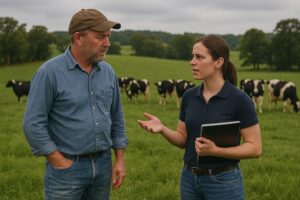As you drive away from home tomorrow morning, with price list or bid sheet in hand and bravely venture out to meet with prospects & customers, you will undoubtedly be thinking of how your farm calls will go for the day. You might ask yourself, “Will I meet with a lot of resistance & complaints or will I finally be rewarded for all the hard work I have put in to sell my products with this customer?” If you have been on territory for longer than a couple months, then you might recognize some of the farmers listed below. It’s certainly not all inclusive. I would also say that farmers, as with any group, can be a mix of any of these categories depending on the day or how their business is going. It definitely will depend on how their latest experience with you and your company went. If it’s been a rough experience for them, then you probably will see a lot of #7’s on your calls.
#1 The Large Operator
As the name indicates, this operation is large or larger than most in the area. Multiple families may be involved as well as more employees or managers involved. It can have a more complex or longer sales cycle associated with the account as decisions may have to work their way through several people. It’s worth the effort to stay with this type of account as it may take longer but certainly has higher rewards. Due to the size of this account, they will typically have a lot of sales people calling on them. You will need to find a way to stand out from the crowd of pickups driving onto the farm each day. How? Network-Network-Network. Find out what trade shows they go to and attend. This will be one of their primary information sources. Be up on the latest trends. They don’t have time to train you. Network with companies who supply them with products (other than your competitors obviously). Know and understand their customers. They are in business just like you and have to answer to their customers. Helping them better serve their customers is one quick way to capture their attention. One last piece of advice on a large account – don’t try to switch the entire business overnight to your products. It’s a big operation and feels risky for someone to make that kind of change. Try a test run, test plot, feeding trial, feed one building or pen of animals, etc. Make that trial run a success and then you can work on becoming their primary supplier.
#2 The Not So Large Operator
See above. The info there is mostly the same except the decision process and number of employees might not be as complicated. The decision here is how much time and effort do you have. I know we all want to treat everyone as equal but doing so will eventually lead to you running out of capacity.
#3 The Cob Roller
So named due to fact that this individual has the innate ability to not make a decision by slowly rolling a corn cob around with their foot in the driveway as you ramble on and on with your sales presentation. Suffice it to say, you have not made a deep enough connection with this person or you would be getting more feedback than you are. Stop presenting! Go back to the “Discovery” phase of the sale and start asking questions. Preferably open ended questions that elicit more than a yes/no answer.
#4 The Info Junky
There are two types in this category. One type just loves information, loves to learn and needs a lot of information to make a decision. The second type is picking your brain. Stripping every nugget of information in an effort to see what you know or take that info and use it with their current supplier. Most companies have tons of information behind their products and you should feel free to bring and present this info as needed. However, make sure you are moving this person through the sales process or you could get stuck in the “Info Zone” with this prospect. It certainly feels good to be helpful and an information source for a prospect. Just make sure the sales process keeps moving along.
#5 The Loyal One
Loyalty to a supplier is certainly admirable and something we definitely want from OUR customers but it can be tough to deal with when calling on a prospect. Try to understand their desire to be loyal. Respect their decision to remain with their current supplier. They may not make changes quickly and you are new to their world. So stay in contact and keep them updated on you, your company or the industry. The mistake I see sales people make with this type of farmer is to expect to get their business too soon. They get frustrated or quit trying to sell them because they feel like they are getting nowhere. Reset your internal timeline as to your expectations with this prospect. You might be in the number two spot for a while with this prospect, which is not a bad spot to be in when things go wrong with their current supplier. Be patient and see my comments on #7 below.
#6 The Busy One
We’re all busy and consumed with meetings, deadlines, e-mails, Twitter feeds, etc. Nothing new here. However, the key to calling on this farmer is first and foremost – timing. If he’s truly busy because it’s the busy season – planting or harvest, then obviously come back or tailor your sales call accordingly. The side of a combine is no place to break out the I-Pad or PowerPoint presentation (I have seen this actually happen). If this farmer is just always in a state of being busy, show them you understand how busy he is by being quick, to-the-point with very clear communication as to what you need to accomplish on the call. I have been on calls where the sales person is just not picking up any of the clues that this customer is in a big hurry. Be prepared and have short, easy-to-read handouts if you bring any at all.
#7 The Angry One
The good and the bad part of this is that grain and feed companies (maybe all companies) have a way of eventually making their customers angry. It’s not an easy business to be in. So, if you are the one receiving the brunt of the anger, just listen, listen and then listen a little more. Don’t explain. Just listen and maybe ask a few clarifying questions. Take notes. Let them know what you can and can’t do. Follow up with them as fast as you can. Anger doesn’t get better with time. It just simmers and embeds itself in the customer’s mind. Then they go to the next gathering or café and tell their friends. Not good. It’s a small community and reputation travels fast. Resolve it quickly. Don’t expect words to replace actions. I have seen many times where a company will apologize or publish a letter of explanation. These are fine and may be needed. However, the proof is how well you fixed the problem. If fixed, then trust can be built back up. If not, words, letters and concern mean very little.
Good luck tomorrow as you make that journey onto the farms and good luck with whichever one of the above you happen to run into.
To sign up for future blogs, go to www.GregMartinelli.net and connect with me on LinkedIn.



